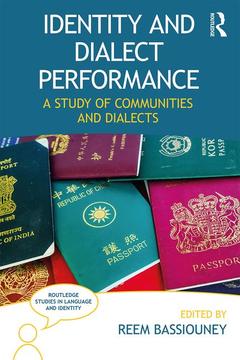Identity and Dialect Performance A Study of Communities and Dialects Routledge Studies in Language and Identity Series
Coordonnateur : Bassiouney Reem

Identity and Dialect Performance discusses the relationship between identity and dialects. It starts from the assumption that the use of dialect is not just a product of social and demographic factors, but can also be an intentional performance of identity. Dialect performance is related to identity construction and in a highly globalised world, the linguistic repertoire has increased rapidly, thereby changing our conventional assumptions about dialects and their usage.
The key outstanding feature of this particular book is that it spans an extensive range of communities and dialects; Italy, Hong Kong, Morocco, Egypt, Syria, Japan, Germany, The Sudan, The Netherlands, Nigeria, Spain, US, UK, French Guiana, Colombia,and Libya.
Contents
List of Figures
List of Tables
List of Contributors
Introduction
I. Dialects in Localised Delocalised Contexts
1. Nonstandard dialect and identity
John Edwards (St. Francis Xavier University)
2. The elusive dialect border
Dick Smakman & Marten van der Meulen (Universiteit Leiden)
3. Dialect performances in super diverse communities: the case for ethnographic approaches to language variation
Anna De Fina (Georgetown University)
II. Nation-States and Identity Construction in Relation to a Standard and a Dialect
4. The construction of linguistic borders and the rise of national identity in South Sudan: some insights into Juba Arabic (árabi júba)
Stefano Manfredi (Centre national de la recherche scientifique, SeDyL-CELIA)
5. From language to dialect and back: the case of Piedmontese
Mauro Tosco (Università degli Studi di Torino)
6. Darija and the construction of "Moroccanness"
Dominique Caubet (INALCO, Paris, and Centre Jacques Berque, CNRS – MAE, Rabat)
7. ‘Sloppy speech is like sloppy dress’: folk attitudes towards non-standard British English
Carmen Ebner (Universiteit Leiden)
III. Contact, Variation, Performance and Metalinguistic Discourse
8.From varieties in contact to the selection of linguistic features in multilingual settings
Isabelle Leglise & Santiago Sanchez Moreano (Centre national de la recherche scientifique, SeDyL-CELIA)
9. ‘You live in the United States, you speak English’, decían las maestras: how New Mexican Spanish speakers enact, ascribe and reject ethnic identities
Katherine O’Donnell Christoffersen & Naomi Shin (University of New Mexico)
10. The social meanings of Wolof and French: contact dialects, language ideology, and competing modernities in Senegal
Fiona Mc Laughlin
11. The social value of variation in Tétouan and Ghomara (Northwestern Morocco)
Angeles Vicente & Amina Naciri-Azzouz (Universidad de Zaragoza)
12. New presentations of self in everyday life: Linguistic transgressions in England, Germany and Japan
Patrick Heinrich (Università Ca' Foscari)
13. Language and identity in Siwa Oasis: Indexing belonging, localness and authenticity in a small minority community
Valentina Serreli
IV. The Media, Dialect Performance and Language Variation
14. Youtube Yinzers: Stancetaking and the performance of Pittsburghese
Scott F. Kielsing (University of Pittsburgh)
15. Performing Scottish identity on Screen: Language, Identity, and Humour in Scottish Television Comedy
Natalie Braber (Nottingham Trent University)
16. Identity, Repertoire, and Performance: The Case of an Egyptian Poet
Reem Bassiouney (The American University in Cairo)
17. Ruination and amusement – dialect, youth and revolution in Naija
Anne Storch (Universität zu Köln)
18. Dialectal variation and identity in post-revolutionary Libyan media: The case of Dragunov (2014)
Luca D’Anna (University of Mississippi)
19. The effect of TV and internal versus external contact on variation in Syrian rural child language
Rania Habib (Syracuse University)
Index
Reem Bassiouney is Professor of Linguistics at The American University of Cairo. Her recent book publications include Functions of Code-Switching in Egypt (2006), Arabic Sociolinguistics (2008), Arabic and the Media (2010, editor), Arabic language and Linguistics (2012, co-editor), Language and Identity in Modern Egypt (2014), and The Routledge Handbook of Arabic Linguistics (forthcoming, co-editor).
Date de parution : 11-2017
15.6x23.4 cm
Date de parution : 10-2017
15.6x23.4 cm
Thème d’Identity and Dialect Performance :
Mots-clés :
Juba Arabic; Young Man; Turkish Soap Operas; Language Ideology; Nonstandard Dialect Speakers; Mexican Spanish Speakers; Amazigh Language; Metalinguistic Discourse; language; Common Language; John Edwards; Dialect Borders; Dick Smakman; Nigerian Pidgin English; Marten van der Meulen; Cairene Arabic; Anna De Fina; Stance Focus; Stefano Manfredi; Linguistic Repertoire; Mauro Tosco; Dialect Performance; Dominique Caubet; Code Choice; Carmen Ebner; Sudanese Arabic; Isabelle Léglise; South Sudan; Santiago Shez Moreano; English Grammar; Katherine O'Donnell Christoffersen; Ghaddafi’s Regime; Naomi L; Shin; Nigerian Pidgin; Fiona Mc Laughlin; As; geles Vicente; Nonstandard Dialects; Amina Naciri-Azzouz; Senegalese French; Patrick Heinrich; Tv Serial; Valentina Serreli; Scott F; Kiesling; Natalie Braber; Anne Storch; Luca D'Anna; Rania Habib
